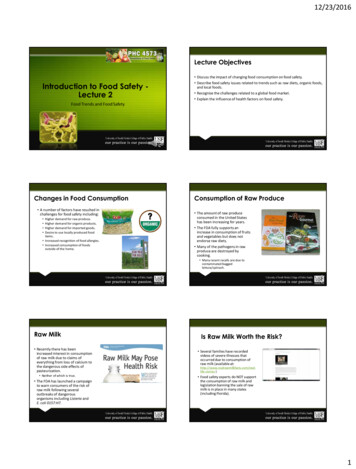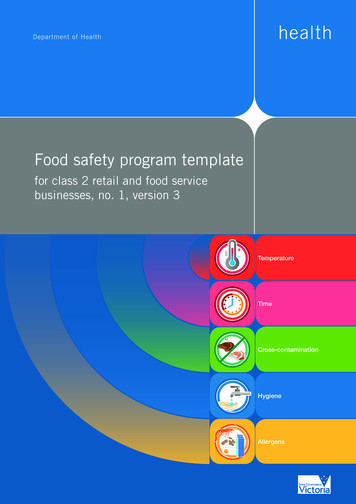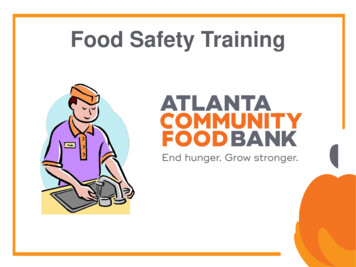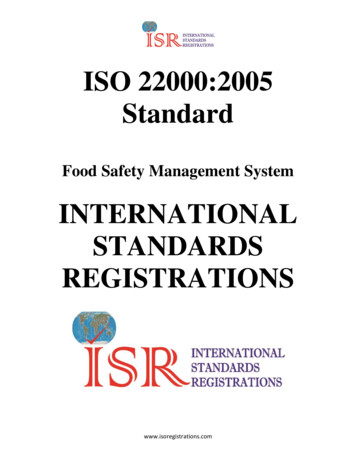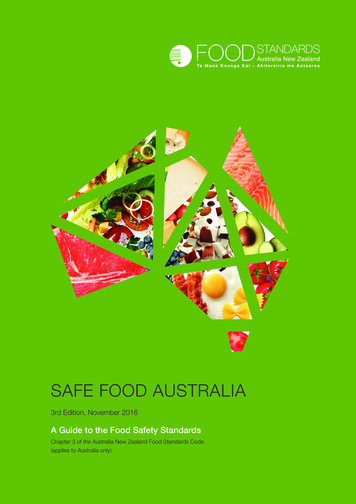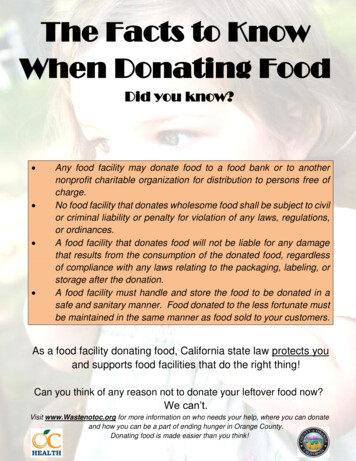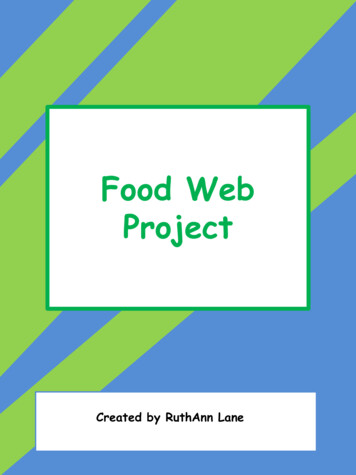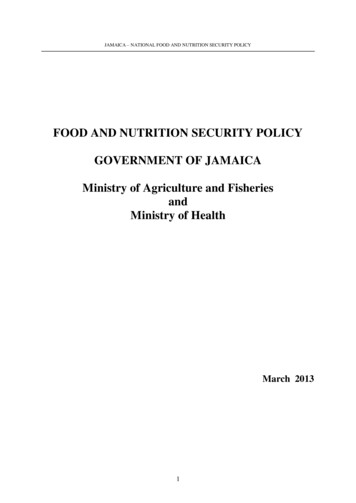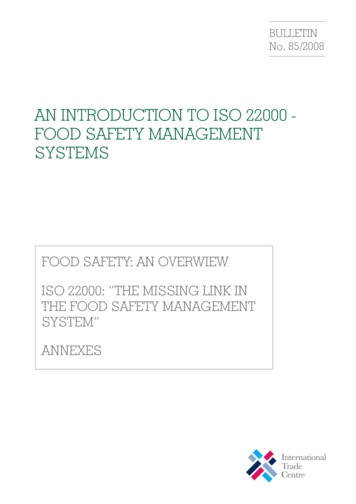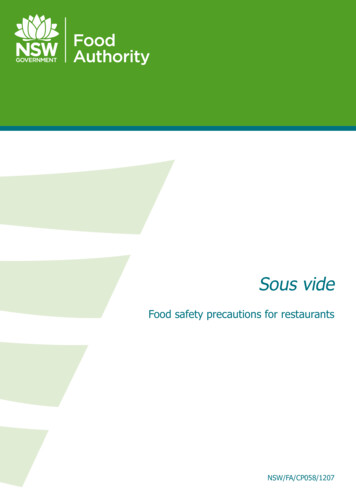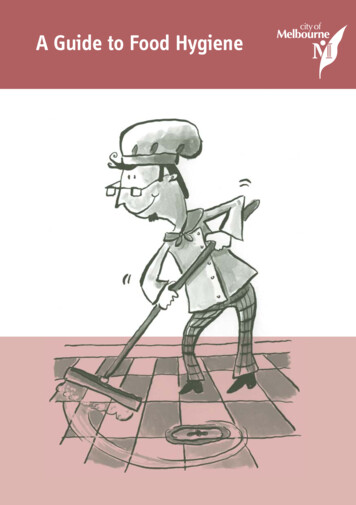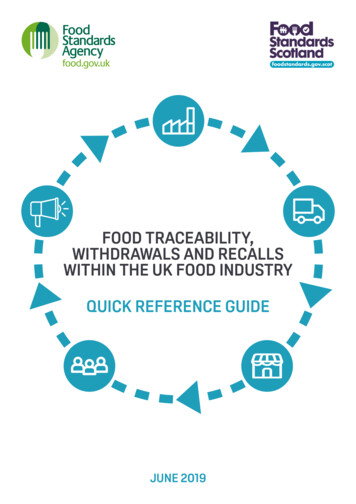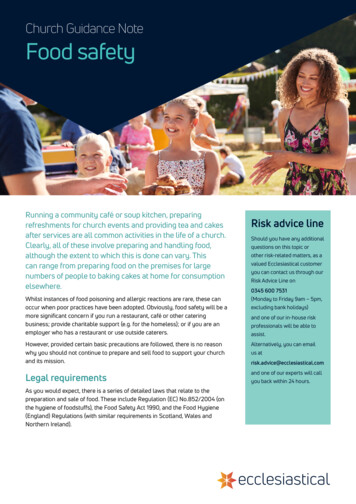
Transcription
Church Guidance NoteFood safetyRunning a community café or soup kitchen, preparingrefreshments for church events and providing tea and cakesafter services are all common activities in the life of a church.Clearly, all of these involve preparing and handling food,although the extent to which this is done can vary. Thiscan range from preparing food on the premises for largenumbers of people to baking cakes at home for consumptionelsewhere.Risk advice lineShould you have any additionalquestions on this topic orother risk-related matters, as avalued Ecclesiastical customeryou can contact us through ourRisk Advice Line on0345 600 7531Whilst instances of food poisoning and allergic reactions are rare, these canoccur when poor practices have been adopted. Obviously, food safety will be amore significant concern if you run a restaurant, café or other cateringbusiness; provide charitable support (e.g. for the homeless); or if you are anemployer who has a restaurant or use outside caterers.(Monday to Friday 9am – 5pm,However, provided certain basic precautions are followed, there is no reasonwhy you should not continue to prepare and sell food to support your churchand its mission.Alternatively, you can emailLegal requirementsand one of our experts will callAs you would expect, there is a series of detailed laws that relate to thepreparation and sale of food. These include Regulation (EC) No.852/2004 (onthe hygiene of foodstuffs), the Food Safety Act 1990, and the Food Hygiene(England) Regulations (with similar requirements in Scotland, Wales andNorthern Ireland).excluding bank holidays)and one of our in-house riskprofessionals will be able toassist.us atrisk.advice@ecclesiastical.comyou back within 24 hours.
Some of these place duties on organisations covering a wide range of aspects. These range from establishingmanagement procedures and the standards required in premises to the training and personal hygiene of thoseinvolved in food preparation. Further information is available at ntially, food supplied, sold or provided outside of the family or domestic setting must be safe to eat. It must not be‘injurious to health’ or ‘unfit for human consumption’. This is regardless of whether those supplying or selling the foodare trying to make a profit.Certain organisations supplying food must be registered as food business operators (FBOs) with the local authorities.This is again regardless of whether this is for profit or not.If you serve or supply food directly to the public, you may also be covered by the Food Hygiene Rating Scheme (orFood Hygiene Information Scheme in Scotland). This means that when your business is inspected, you will be given ahygiene rating, based on the standards found at the time. You will be given a sticker/certificate with your rating orresult to display publicly. Customers can also look these up on the Food Standards Agency’s website.Further information about the schemes is available at www.food.gov.uk/ratingsThe extent to which all of these requirements will apply to you depends upon your particular circumstances.They certainly will if you run a food business. However, where somebody handles, prepares, stores or servesfood occasionally and on a small scale (e.g. a church, village fair or other situations where volunteers preparefood occasionally), they may not. This can be a confusing area of the law and further information is available -community-and-charity-eventsHazards to look out for*Some of the typical hazards include:lDirty or damaged work surfaces and stores in food preparation areaslStorage and preparation of raw and cooked foods togetherlSigns of pests in areas where food may be prepared or storedlFood that is out of date, of poor quality or contaminatedlInadequate cooking, re-heating or thawinglCleaning chemicals stored with foodstuffslFood being prepared too far in advancelFoods containing known allergenslStoring foods at the wrong temperaturelPeople who are ill handling foodlContamination from foreign bodies (e.g. hair, jewellery etc.)lPoor personal hygiene.*This list is not exhaustive
Precautions you can take*Typical precautions include:lKeeping premises clean, well maintained and in good condition – including walls, equipment, ceilings and floorlEnsuring food preparation surfaces are in good condition, being easy to clean and disinfectlPurchasing food from reputable supplierslChecking deliveries to ensure food is supplied packaged safely, at the correct temperature, in date and is clean andundamagedlHaving appropriate stock control procedureslChecking the temperature of any chilling equipment at least once a daylStoring raw and ready-to-eat food properly, e.g. if they are in the same fridge, raw meat/poultry/fish shouldalways be stored below ready-to-eat food in a clearly distinguishable part of the fridge and in covered containerslMaking sure that food is cooked and prepared properlylKeeping food covered to help protect it from bacteria and to prevent contaminationlAdopting good hygiene practices when preparing food, particularly if those involved are sicklTraining food handlers in food hygienelDisposing of packaging materials and food waste properlylPest-proofing your premiseslProviding suitable washing facilities (i.e. wash hand basins, hot water, soap, disposable hand towels etc.)lHaving a dedicated area for storing cleaning chemicals, away from foodstuffs.*This list is not exhaustive
Making a startAction1. Decide what steps you need totake to comply with the law.This will depend on the nature ofthe food preparation activity youare involved in.GuidanceIn many instances, you may not be required to do much more thanfollow good hygiene practices. However, where you prepare foodregularly for others and this requires a degree of organisation –you may have to do more.Useful information, guidance and resources are available at www.food.gov.uk/.It is not always clear whether community and charity food supply,which is often occasional or small-scale in nature, requiresregistration. Guidance on this can be found at ommunity-and-charity-events.If you intend to run a restaurant, café or other catering businessessuch as a shop selling food, you may have to register yourpremises with the local authority (for new business premises, thismust be at least 28 days before opening) and make sure that theinformation they have remains up-to-date by notifying them of anysignificant changes.If you cannot decide what steps to take or whether you should beregistered, contact your local authority environmental healthdepartment food safety team, who will be able to advise you.2. Implement suitable precautions toensure that any food prepared issafe.Where you prepare food regularly for others and this requires adegree of organisation, you may need to consider a range ofprecautions. Obviously, the extent you will need to implement thesewill depend upon your own particular circumstances. They couldinclude making sure that:lllllllllPremises are suitable, properly maintained, clean anddisinfectedThere is no risk of contaminationFood is properly handled and stored at appropriatetemperaturesAdequate staff welfare facilities are provided (e.g. hand washing,toilet facilities, changing facilities etc.)Specific precautions are based on the principles of HACCP (i.e.hazard analysis critical control point) with these beingimplemented where necessaryProcedures are developed to deal with any outbreak of foodpoisoning, foreign body contamination incident or complaintRequired information is provided in relation to food allergies.Further guidance and advice is available at e-for-food-businessesAdequate training and information for food handlers,supervisors etc. is providedSuitable records are completed and retained. These couldinclude those relating to temperature control, maintenance,inspections, as well as those relating to any information ortraining provided to employees and others.
Making a startAction3. Document your arrangements andresponsibilities for foodpreparation.GuidanceRecord the arrangements and responsibilities for managing foodsafety, reviewing these where necessary.If you have prepared a health and safety policy, you could recordthese as part of it.You can use our Church Health and Safety Policy template if youhaven’t done this and need one to comply with health and safetylaw.Want to know more?Other useful health and safety information is available at:www.ecclesiastical.com/healthandsafetyFurther guidance and resources are also available from the Food Standards Agency at:www.food.gov.uk/Note: if you are in Ireland, Northern Ireland, Jersey, Guernsey or the Isle of Man, then regional variations might apply.In this instance, you should check the guidance provided by the Enforcing Agency for your region. This will be freelyavailable on their website.Need to report an incident involving an injury?If an incident occurs that may result in a claim for injury, please retain any accident investigation records, e.g. accidentbook entry, photos etc. and contact our specialist claims team on 0345 603 8381 (Monday to Friday 8am – 6pm) foradvice. Where you have received correspondence about a claim being made against you, it is important that you notifyus immediately and email a copy to our experts on casualtyclaims@ecclesiastical.com.Policy cover queriesFor queries about your policy cover, call our specialist church team on 0345 777 3322 (Monday to Friday 8am – 6pm,excluding bank holidays) or email us at churches@ecclesiastical.com.Alternatively, please visit www.ecclesiastical.com/church.This guidance is provided for information purposes and is general and educational in nature. It should not be used as a substitutefor taking professional advice on specific issues and should not be taken as providing legal advice on any of the topics addressed.Ecclesiastical Insurance Office plc (EIO) Reg. No. 24869. Registered in England at Benefact House, 2000 Pioneer Avenue, Gloucester Business Park, Brockworth,Gloucester, GL3 4AW, United Kingdom. EIO is authorised by the Prudential Regulation Authority and regulated by the Financial Conduct Authority and the PrudentialRegulation Authority. Firm Reference Number 113848. Ecclesiastical Insurance Office plc 2022PD3042 1 03/22
Disposing of packaging materials and food waste properly . l. Pest-proofing your premises . l. Providing suitable washing facilities (i.e. wash hand basins, hot water, soap, disposable hand towels etc.) . 2000 Pioneer Avenue, Gloucester Business Park, Brockworth, Gloucester, GL3 4AW, United Kingdom. EIO is authorised by the Prudential .
